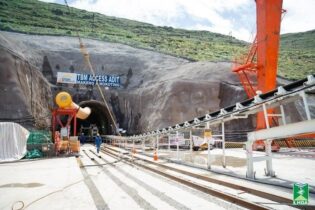The Aggregate and Sand Producers Association of Southern Africa (ASPASA) is a voluntary producers association that helps to improve the quality of aggregates produced by its member companies for construction projects around the country.
The role that ASPASA plays is critical considering that almost every structure made by man relies on aggregates for strength and stability. In fact, construction aggregates are the primary ingredients of all concrete structures and foundations (80% of concrete is aggregate), as well as being the single most important ingredient used to build our roads (94% of a road is aggregate). The aggregates and sands used in construction projects are naturally occurring minerals that are mined by a specialised sector of the mining industry in South Africa – mainly from quarries. Government strictly regulates sand and aggregate quarries due to the importance of obtaining a reliable supply of quality materials. It also aims to ensure that the minerals and materials are removed in a manner that is sustainable and protects the rights of workers, as well as the environment and surrounding communities. Responsible association “As a private sector association representing producers in the industry, we uphold these aims. In addition, we strive to create an economically viable industry with good interaction between all parties involved, from the industry, as well as the relevant government departments and other stake holders,” says Nico Pienaar, director of ASPASA and of the Southern African Readymix Association (SARMA). “Our focus remains largely on creating an environment that is fair and equitable, gives our members space to manoeuvre and to make a good living. On the other hand, we expect members to comply with all relevant legislation, as well uphold the strictest standards in quality, health, safety and environmental issues. Annual audits are in place to assist members to achieve set requirements and also to ensure that they comply with the relevant legislation. “We also encourage skills development and nurturing of expertise though our close working relationship with the country’s training authorities, as well as hosting regular workshops and seminars.” Working togetherPienaar explains that quarries represented by ASPASA work closely with the government and the Chamber of Mines and are able to give input on a wide spectrum of legislation that affects the industry, including input on critical issues surrounding the environment, as well as health and safety matters. These important issues are represented through expert committees with senior and knowledgeable specialists serving to give informed input on all matters. Through these committees, programmes are also developed to assist the industry to meet development objectives and improve the overall standards on member mines.
A specialist technical committee also represents the industry on matters that can influence the industry. It works with other industry bodies to ensure that specifications for construction work are up to standard and cost effective. Other work carried out by the association includes assistance with human resources, remuneration surveys, workshops on Aids and labour law, employee product assistance (medical aids, pension, etc.). The association also actively promotes the industry as well as the importance of using ASPASA-accredited companies. Adopting change “In addition to this, ASPASA supports the adoption of a proactive strategy to foster change and to encourage black economic empowerment and transformation in a sustainable and economically sensible manner,” says Pienaar. For this reason, the association subscribes to the aims of the BBBEE charter for the mining industry. In particular, the pillars of transformation related to:- human resources development
- employment equity
- encouraging greater community participation and development
- promoting greater procurement from HDSA (Historically Disadvantaged South Africans) companies
- encouraging greater HDSA ownership
- participation and facilitating beneficiation.







